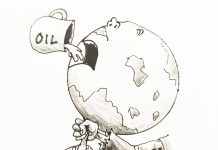It is one thing to show the world evidence, file legal cases, and let the process run without hindrance. But when political rivals are igniting torches and sharpening blades, the hunt is no longer justice, but theatre. It becomes barefacedly clear that the purpose is neither truth nor accountability, but extermination. This is the time-tested anatomy of political destruction—where power is exercised not to construct a nation, but to dismantle opposition power. In so doing, we start to decay from the inside out, as democracy is reduced to a shootout of whoever is most popular, sponsored by those who do not want to lose their crowns.
It is not merely the Dutertes and the Marcoses. It is about a perilous phenomenon in Philippine politics wherein public stance is a conflict of opposing clans, with the people just pawns instead of being the final authorities. The harm goes beyond headlines—it infects our national conscience, anesthetizing us to the loss of faith in our institutions. When politicians are more concerned with making points than with serving their constituents, public trust breaks like an eggshell crushed by the heel of a heavy boot. And we know that once broken, trust rarely comes back to its former strength.
Even the greatest institutions can be no greater than those who occupy them. When prosecutors are made puppets, when courts curtsy at the mention of a palace’s caprice, and when threats of impeachment are used like fishhooks before the unsuspecting, then we are no longer ruled by law, but by drama. And a heartless drama at that—where actors wear masks of virtue, but conceal daggers behind them. The voters, meanwhile, sit on the sidelines, silenced and forced to cheer or jeer on somebody else’s command.
Let us not act like this is something novel. Power politics masquerading as policy have been a staple of Philippine politics for a long time. Politicians here love to clothe their scores with legal garb and pretend it’s for the people. But beneath that barbed Tagalog and sanctimonious talk are fragile egos concealed in barbed ambition. What we see happening today is but a brasher incarnation of an ancient game—an ancient game that belittles the wisdom of a people wiser than the elites would have them believe.
And when politicians change overnight—from defender to guardian, from foe to friend—simply on the strength of votes gained in an election, it is a guarantee of what everyone is sure of: that values can be discarded, that moral positions are for sale. This is a mockery not only of democratic processes, but of leadership itself. If their leaders are not constant in what they think, if they dance to the beat of power rather than march to the drumbeat of justice, how could they possibly be entrusted with the future of a nation?
The citizens are not a naive crowd for elites to inform them as to whether a person is correct or incorrect. The electors are forgiving, but not idiots. They spot hypocrisy even when it’s shrouded in legalese or trumpeted publicly in self-serving press conferences. All that they need is to form their own opinions. Take that from them, and you create their disillusionment—and eventually, their revolt. That is how institutions crumble: not in a blast, but in a gradual, incremental drift away from the people that they are meant to serve.
Perhaps the better way is to trust in the people, not the politicians. Let the courts function, for sure—but let them function without the shadow of political vendetta hanging over them. And above all, let the voters do what the system exists for: elect the destiny of leaders, not through choreographed knockouts, but through the ballot box. Because true change—true, enduring, and meritorious—does not come out of adversaries breaking each other. It comes from the people making sound decisions and being allowed to do so freely.




